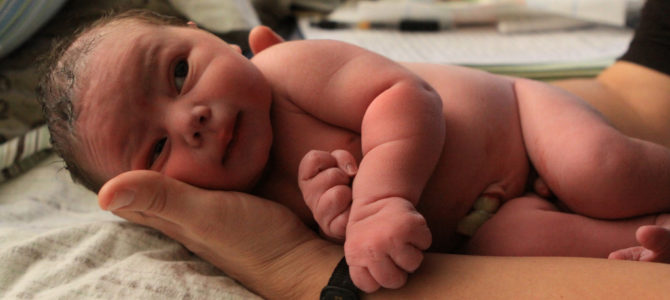
Some decades ago, my father, reflecting on my recent birth, wrote in my baby book that I was, as are all babies, “a miracle clothed in flesh.” Dismiss this sentiment as you see fit: the sweet but mawkish gushing of a father with a newborn; the overprotective emotional preening of an insufferable millennial brat; a run-of-the-mill baby book sentiment. It could be one of these things, it could be all of them—but it also happens to be right. My father was correct: babies are miracles.
I know this because just recently I watched my wife push our new baby son out into the world. Our society has built a great deal of baloney around the awesome and staggering phenomenon of labor and birth, but the one common refrain that they all say is true is actually true: there is nothing like it. I know the biology, I had seen the ultrasound, I had been by my wife’s side for 12 hours as she moaned, breathed, and eventually pushed, and still I was not prepared for what seemed for all appearances to be magic: one second there was nothing in my wife’s arms, the next there was a baby boy, pink and healthy and beautiful and priceless.
For one of the few times in my life I was rendered speechless, and properly so. What do you say, after all, when you witness a miracle?
When the Ordinary Is Also Miraculous
We know, of course—contra the insistence of our country’s monomaniacal abortion machine—that birth is not actually a magic trick, that human beings are not created ex nihilo after they pass through the birth canal and into the wider world. Our boy was still our boy five seconds before he was born, and five weeks, and five months.
There is, to be sure, something workaday and ostensibly unremarkable going on in the pregnant woman’s uterus. But the grounded reality of human reproduction does not detract from the basic miraculousness of babies. Rather, it adds to it, underlines it, strengthens it into something both more elemental and more profound than simple evolutionary propagation.
From simple nutrients and enzymes and lipids and nucleic acids comes this, a little ball of keening fat that nonetheless proclaims, as Jonathan Safran Foer once wrote, that “everything is possible again.” A few months ago I packed my wife an egg salad sandwich for lunch, and her body used that egg salad to help create our beautiful baby boy. What is a miracle, if not that?
The atheists and the lazier agnostics among us make a critical error in assuming that what is contingent upon human behavior—in this case, sexual intercourse and gestation and ultimately a new baby crying in your wife’s arms—is not miraculous insofar as human beings themselves are simply clever hairless apes, which are themselves simply clever bipedal animals, and so forth.
But this question-begging cannot go on indefinitely. Once you have dealt with the stromatolites and the protoplanetary disk and the baryogenesis and the singularity, you must still account for the existence of existence itself. You must still answer the question, “Why is there something rather than nothing?”
From Thought Into Being
Why is there something rather than nothing? That question is not rhetorical; it need not even be theological. But it is, undeniably, consequential. Why is there something rather than nothing? Why is there a strong, beautiful wife and a new baby boy rather than no wife and no boy and nothing else? Why is there joy rather than unplumbable darkness? Why is there love rather than a meaningless void to which even reference is concurrently impossible?
The modern response to that question gets dressed up in a lot of deceptively ornamental language that essentially boils down to, “Stuff just is.” It is ultimately a shallow response, made all the more shallow by its sneering rationalistic pretenses.
Many of us can see the fundamental absurdity of such a proposition, and recognize the miracle of birth for the literal miracle that it is. My father recognized, as Bishop Robert Barron points out, “When we understand a truth, we say we recognize it,” i.e. re-cognize it, we “think it again, because it’s already been thought into being.” By who? By God, of course—who works all miracles, and who wants desperately for us to see these miracles for what they really are.
My father died years ago, and is gone to whatever miracles there are. I wish he were here to meet his grandson, to look upon yet another miracle clothed in flesh. But I am grateful for the lesson he imparted when I was born, a lesson brought full circle when my own son was born in turn. Were I to see my father again, I would tell him, after all this time: I get it now, dad. You were right.









